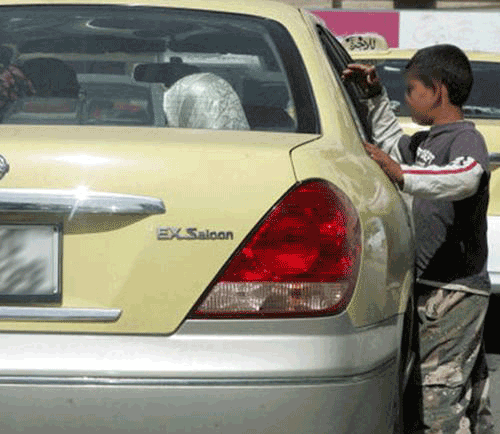AMMAN — A position paper published by local NGO Tamkeen for Legal Aid and Human Rights argues that the phenomenon of child begging in Jordan is driven by a number of socioeconomic factors.
The paper noted that unemployment, reflected in the “economy’s receding ability to generate jobs” and exacerbated by the outbreak of the COVID-19 pandemic, has caused many families to turn to child labour for income.
Deteriorating conditions in the labour market have increased the number of children involved in dangerous professions and other forms of exploitation, such as forced begging, the paper said.
High poverty levels are also pushing children into panhandling, according to the paper, which stated that one in five children in Jordan live in multidimensional poverty.
The paper also pointed out that the poverty indicators issued by the Department of Statistics (DoS) show that the poverty rate among Jordanian individuals has reached 15.7 per cent, which means that 1.069 million Jordanians live below the poverty line.
Moreover, the paper attributed child begging to the low quality of public school education, mainly due to the crowdedness of classrooms and the shift to remote learning during the pandemic — which was not accessible for all children.
This reflected poorly on children’s academic achievement, and forced many into child labour and begging in order to help their families deal with the economic repercussions of the pandemic, the paper said.
Although 97 per cent of primary-school-aged children in Jordan are enrolled in schools, many improvements are still needed to ensure that schools meet the needs of children with disabilities, refugee children and working children who are more vulnerable to violence and bullying, and are more likely to drop out, it added.
According to the paper, interviews with the employees of care centres for children involved in begging in Madaba and Al Daleel revealed that their programmes are limited to extracurricular and basic educational activities, which hinders the children’s reintegration into schools.
Other reasons for child begging mentioned in the paper include not receiving a sufficient allowance from parents, struggling in school, being rewarded for begging by parents and begging to buy medicine for a sick family member.
The paper also noted that for many children, begging is their “family profession”, and not a temporary solution to survive the tough economic situation.
“Many people give money to beggars out of empathy and compassion or are driven by their religious morals to do charity work,” the paper added, noting that this behaviour encourages panhandling as an easy way to make money.
The paper also noted that “begging makes children more vulnerable to physical, psychological, sexual and verbal abuse”.
“Children involved in begging are also more likely to fall victim to human trafficking for the purpose of sexual exploitation, organ removal or smuggling and dealing drugs,” it added.
Tamkeen’s paper stressed the necessity to enhance cooperation between concerned civil society organisations and governmental institutions to curb child begging, and the need to create a unified database to allow the Ministry of Education, vocational training centres and the Public Security Directorate to work in a systematic manner in order to prevent children from dropping out of school.
It also recommended engaging children above the age of 16, who lack interest in academic education, in vocational and occupational training programmes. The paper also called for improving and increasing the number of after-care programmes for children who have been arrested for begging to provide them with adequate educational services and ensure their reintegration into schools.
Other suggested solutions to curb the phenomenon of begging among children included broadening the government’s social protection umbrella, raising society’s awareness and enforcing stricter penalties on those who exploit children for begging or other forms of forced child labour.
A Ministry of Social Development statement made available to The Jordan Times showed that the number of individuals arrested for begging has increased by over 200 per cent since 2017.
The Anti-Vagrancy Department arrested 13,558 beggars in 2021, 7,981 of whom were juveniles, while 2020 saw 5,406 individuals arrested for begging, 2,413 of whom were juveniles, according to the statement.
